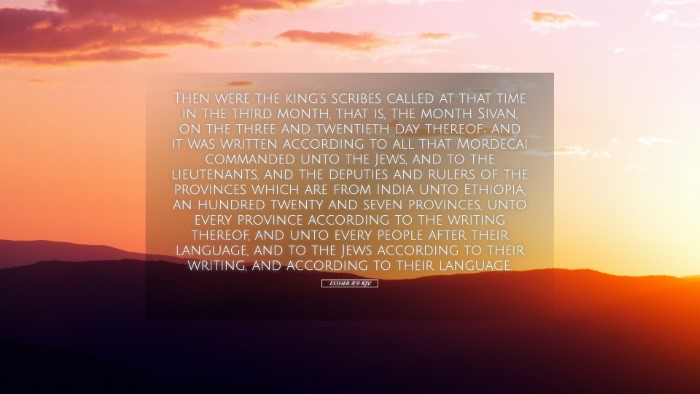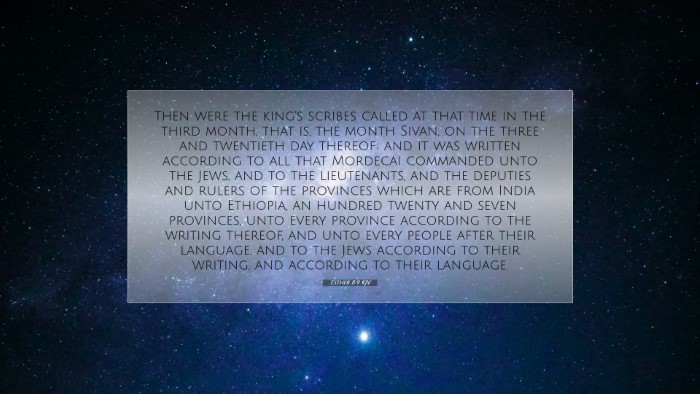Old Testament
Genesis Exodus Leviticus Numbers Deuteronomy Joshua Judges Ruth 1 Samuel 2 Samuel 1 Kings 2 Kings 1 Chronicles 2 Chronicles Ezra Nehemiah Esther Job Psalms Proverbs Ecclesiastes Song of Solomon Isaiah Jeremiah Lamentations Ezekiel Daniel Hosea Joel Amos Obadiah Jonah Micah Nahum Habakkuk Zephaniah Haggai Zechariah MalachiEsther 8:9
Esther 8:9 KJV
Then were the king's scribes called at that time in the third month, that is, the month Sivan, on the three and twentieth day thereof; and it was written according to all that Mordecai commanded unto the Jews, and to the lieutenants, and the deputies and rulers of the provinces which are from India unto Ethiopia, an hundred twenty and seven provinces, unto every province according to the writing thereof, and unto every people after their language, and to the Jews according to their writing, and according to their language.
Esther 8:9 Bible Commentary
Commentary on Esther 8:9
Verse: "So the king's scribes were called at that time, in the third month, that is, the month of Sivan, on the twenty-third day; and it was written according to all that Mordecai commanded unto the Jews, and to the lieutenants, and the deputies and rulers of the provinces which are from India unto Ethiopia, one hundred twenty and seven provinces, unto every province according to the writing thereof, and unto every people after their language, and to the Jews according to their writing, and according to their language."
Introduction
Esther 8:9 captures a pivotal moment in the narrative, showcasing the mechanism of communication and the practicalities of governance in Persia. The organization of the decree, commanded by Mordecai, bears significant theological and historical implications. This commentary synthesizes insights from major public domain commentaries to explore the depth of this verse.
Historical Context
Esther's narrative unfolds during a time of great peril for the Jewish people, following Haman's decree for their extermination. The king's actions, influenced by Mordecai and Esther, reflect a significant reversal of fortune. The use of scribes to disseminate information aligns with Persian practices, which were characterized by a high degree of bureaucratic sophistication.
The Role of the Scribes
According to Matthew Henry, the calling of the king's scribes was crucial for the authoritative communication of the decree. This demonstrates a structured approach to governance where official scribes, skilled in reading and writing, assisted in the administration of royal will. Henry illuminates how God's providence is evident through the meticulous planning of this communication.
Mordecai's Leadership
Albert Barnes addresses Mordecai’s leadership by emphasizing his role in crafting the decree that would not only protect the Jews but also empower them to defend themselves. Mordecai's instructions evoke themes of justice and divine intervention, showcasing a leader who is both strategic and courageous. His commands highlight the importance of careful planning in times of crisis.
Geographical and Cultural Scope
The decree's circulation to "one hundred twenty and seven provinces, unto every province according to the writing thereof" reflects the vastness of the Persian Empire as noted by Adam Clarke. This scale signifies the importance of the Jews across diverse backgrounds, suggesting their integration yet distinct identity within the empire. Clarke points out that the mention of various languages underlines the universal reach of the message, emphasizing how God’s deliverance was meant for all of His people.
Theological Significance
This verse serves as a testament to God’s providence and the importance of obedience to divine direction. Matthew Henry articulates that the swift action of writing and dispatching the letter reveals the urgency of fulfilling God’s plan for His people. The timely response and strategic communication serve as a reminder that spiritual and practical steps must align in times of distress.
Linguistic Considerations
The specifics of "after their language" as noted by Albert Barnes imply that the decree was not merely translated but was made relevant to each audience. This intentional effort underscores the importance of addressing people in a manner they understand and connects to the broader biblical principles of evangelism and clear communication of the gospel.
Practical Applications for Today’s Leaders
For pastors, students, and scholars, Esther 8:9 offers rich insights into the foundational principles of leadership, communication, and advocacy. Leaders are prompted to communicate effectively and consider the wide-reaching implications of their decisions. The verse encourages a holistic approach, recognizing the dynamic interplay between faith and action.
- Importance of Effective Communication: Just as Mordecai ensured the decree reached everyone in a manner they understood, today’s leaders should consider how effectively they communicate their message within their communities.
- Awareness of Cultural Diversity: The recognition of different languages and audiences reinforces the need to engage diverse communities with sensitivity to their unique contexts.
- Advocacy for Justice: Mordecai’s role in advocating for his people showcases a biblical framework for standing up against injustice, encouraging modern leaders to take a stand for the marginalized.
Conclusion
Esther 8:9 stands as a powerful reminder of God’s sovereignty and the role of faithful leaders in challenging circumstances. The theological implications sift through history, prompting contemporary believers to embody virtues of courage, wisdom, and effective communication. As we reflect on this verse, may we be inspired to act wisely and faithfully, trusting in God’s providence while taking tangible steps to support justice and righteousness in our communities.


